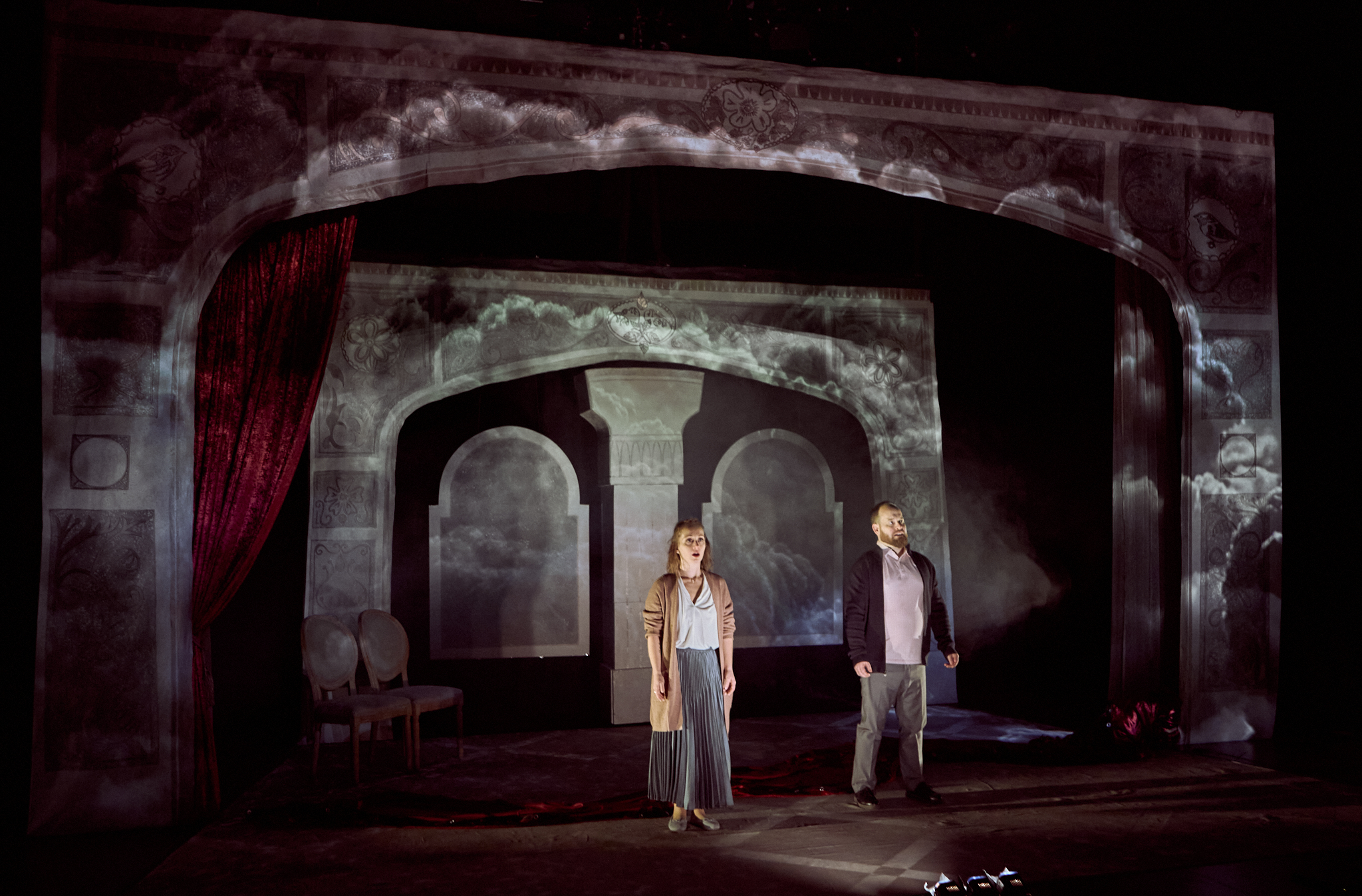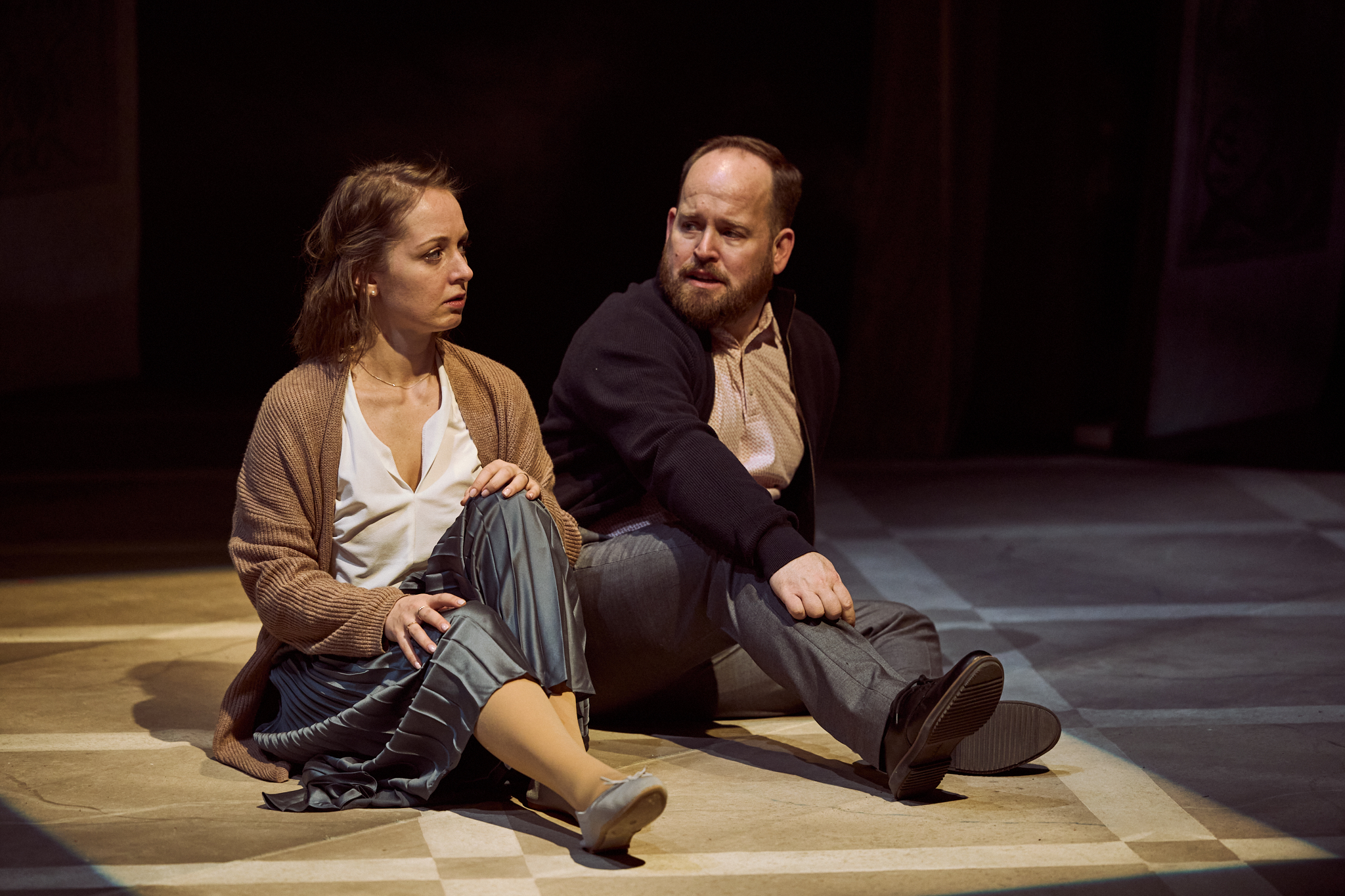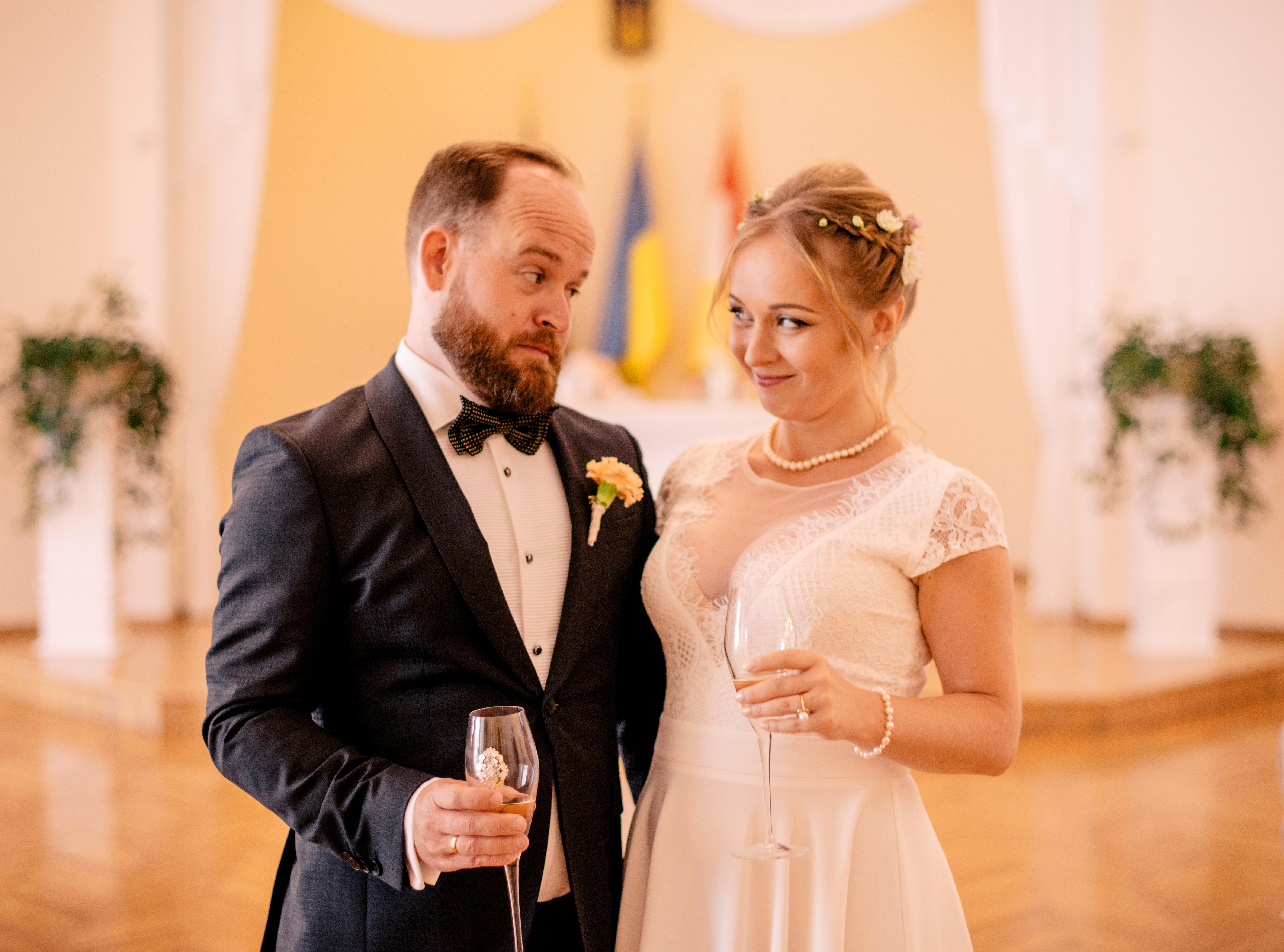This might be unorthodox – I want to begin this review on a personal note. I am an obsessive gift giver – I tend to expend copious efforts to plan and execute personalized birthday gifts for loved ones. This time around, I was stuck in a creative rut. I had no idea how to make my partner’s birthday special. A few days ago, our team at Vancouver Arts Review received an invitation from the Cultch to review First Métis Man of Odesa, set to premiere on May 25th at the Historic Theater. A brief description mentioned that this play is an autobiographical love story set in the contemporary world. This got me intrigued. The show’s Vancouver premiere happened to coincide with my partner’s birthday. I immediately signed up as a reviewer and requested to bring a guest with me – my partner, of course.

FIRST METIS MAN OF ODESA featuring Matthew MacKenzie and Mariya Khomutova. Directed by Lianna Makuch, Production Design by Daniela Masellis, Projection Design by Amelia Scott. Photo by Alexis McKeown
First Métis Man of Odesa is a 90 minute theater production that portrays the ups and downs and twists and turns of Matt (Matthew MacKenzie) and Masha’s (Mariya Khomutova) real life love story. Theater artist and producer Matt is cognizant of his Métis heritage, taking pride in his Edmontonian identity. Ukrainian actor Masha is a 7th-generation Odesan who feels firmly anchored in the region’s arts and high culture. Their intercontinental love story begins in Ukraine over artistic collaborations and feisty discussions about culture and geopolitics. The two Pisces don’t always see eye to eye. For instance, Masha’s romanticism about Russian playwrights is dampened by Matt’s skepticism about Russia’s colonizing ambitions. Despite such clashes in their worldview, when Matt moves back to Canada, they continue their interactions over the internet. Eventually, they feel a deep connection – a sense of destined belonging with each other. While they navigate the pangs of geographical separation, life throws them some curveballs – first the pandemic and then a surprise pregnancy. Overcoming challenges of international travel bans, Matt undertakes a heroic journey to wed Masha in her hometown of Odesa. They then fly to Canada to welcome the birth of their darling son, Ivan. Most love stories end on this rosy note, but alas. Their little one gives them sleepless nights and the couple’s anxieties reach an all time high due to Russia’s invasion of Ukraine. The play ends on a sentimental note, with an ode to Ukraine’s unflinching resistance against Putin’s imperial ambitions, heralding hope for better times to come.
The play deftly lays out the complex politics of war, migration and resistance against imperial colonizers. Masha’s story arc takes her from being a free-spirited artist to a rather sudden transition into motherhood, lending a poetic metaphor for the plight of Ukraine’s cultural and political sovereignty in the face of Russia’s invasion. Matt is Masha’s love and ally. He is invested in Ukraine’s geopolitical affairs, striving to document the human impact of war by means of artistic expression. Matt and Masha’s love for Ivan reinforces hope about a more collaborative and peaceful future. Like all love stories, theirs involves numerous other characters. Masha’s mother Olga stood out to me. She is wrenched away from her land, forced to assimilate into her daughter’s household. Masha has inherited her grandpa’s fondness for Russian playwrights and opera. Olga might have to heal from the trauma of Putin’s invasion, so she can bestow similar uplifting cultural memories to her grandchild.

The set design and costumes are elegantly minimal. Two chairs, a long red veil and a translucent screen creatively aid the storytelling, becoming visual narrative devices. The chairs seem to have a life of their own: they sometimes become stand-ins for missing characters, at other points, they embody the emotional tenor of the lead pair. The screens are drawn in and out – indicating the physical and/or emotional distance that the pair is forced to navigate at various points. Light and sound effects are used cleverly – the simulated airplane journeys, the moonlit glow on the shores of Black Sea, the firework display at Niagara Falls were my favorites.
More often than not, sensational media coverage of war tends to have a disturbing effect on survivors. This play is a testament to Masha and Matt’s commitment to communicate the devastating impact of political violence on human lives without fetishizing trauma. The play is an authentic and vulnerable offering to those who feel valorized for being victims of violence and needless suffering. It takes immense courage and mutual respect to present the private unraveling of a romantic relationship. Matt and Masha do it with grace and humor.

Why did I start this piece on a personal note? I saw many parallels between the lead pair’s love story with that of mine. My partner and I were in a long-distance relationship before the pandemic. We navigated unforeseen emotional upheavals in the lead up to a rushed wedding during the pandemic. The depiction of the truth behind a “happily ever after” in the play also resonated with our marriage – an evolving affair rife with rough patches, therapists and a lot of emotional labor from both of us. This might have been why ‘First Métis Man of Odesa’ spoke to us profoundly. We came out of the theater in tears and warm feelings. Matt and Masha’s soul-stirring articulation of their love for each other and li’l Ivan has helped reinforce my faith in the transformative promise of love.
‘First Métis Man of Odesa’ is a production of Punctuate! Theatre (Edmonton). Presented in Vancouver by the Cultch, in association with rEvolver Festival, shows run from May 25-June 4, 2023. Book your tickets here.
– Annapoorna Shruthi
